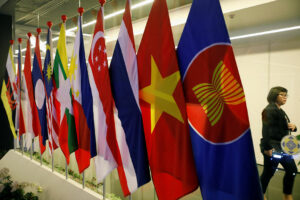
Manila told to push navigation freedom at TAC meeting

By Chloe Mari A. Hufana, Reporter
THE PHILIPPINES should use its hosting next year of the 50th anniversary conference of the Treaty of Amity and Cooperation (TAC) in Southeast Asia to advance freedom of navigation and territorial integrity, according to a political analyst.
The country’s hosting of the conference and its chairmanship of the Association of Southeast Asian Nations (ASEAN) allow it to reaffirm its commitment to regional peace and stability, Josue Raphael J. Cortez, ASEAN Studies lecturer at De La Salle-College of St. Benilde, said on Thursday.
Its chairmanship of the regional bloc and hosting of the event “hold great strategic significance,” he said in a Facebook Messenger chat, noting that the country was among the main signatories of the treaty and one of the founding members of the bloc.
The TAC, he added, shows the bloc’s commitment to peace and stability, as well as adherence to international norms.
“This hosting of the TAC conference will further legitimize our role and strengthen our importance as among the primary key players in Southeast Asia and the developing world promoting public international law and other international norms,” Mr. Cortez said.
He said tensions in the South China Sea and the recent Thai-Cambodian border standoff, are a remainder of the treaty’s relevance.
Philippine President Ferdinand R. Marcos, Jr., during the 46th ASEAN Summit last month pushed a legally binding code of conduct in the South China Sea, warning that rising sea tensions and uncertainty threaten hard-won regional gains.
The sea remains one of the region’s flashpoints, as China, the Philippines, Vietnam, Malaysia, Brunei and Taiwan assert their overlapping claims.
While ASEAN and China agreed on a Declaration of Conduct in 2002, progress toward a binding framework has been repeatedly delayed by legal, political and strategic differences.
The Department of Foreign Affairs (DFA) has said the Philippines would host the TAC conference but has not yet announced the dates. The last TAC conference was held in Vientiane, Laos on July 24, 2016.
Discussions at the 2026 conference could center on how the treaty could evolve into a more robust framework for addressing regional issues without undermining the ASEAN way of consensus and neutrality, Mr. Cortez said.
Last amended in 2010, the TAC is ripe for modernization. With the rise of hybrid threats, including cyberwar and artificial intelligence (AI), the Philippines is pushing ASEAN to take the lead in formulating responding to emerging realities.
“There’s potential for a pan-ASEAN AI governance initiative to be embedded in the TAC’s future iterations,” Mr. Cortez said. “This shows that ASEAN isn’t just a diplomatic community of the past but a norm-setting force for the future.”
He added that the effort could align with a broader outreach to non-ASEAN stakeholders. The Philippines could explore engaging Gulf states and even China during concurrent ASEAN-Gulf Cooperation Council and ASEAN-China meetings, he added.
“If we’re able to do that under our chairmanship, it will be a milestone, a demonstration that the Philippines can serve as an amalgamating force in the region,” the ASEAN expert said. “It would reinforce ASEAN’s potential to evolve into a normative power akin to the European Union.”
He also said the TAC conference could serve as a forum for ASEAN to articulate a more cohesive position on neutrality amid the intensifying US-China rivalry.
“There’s a growing risk of armed conflict between great powers in our neighborhood,” he said. “The Philippines can lead discussions on how ASEAN can safeguard its collective interests should such a scenario unfold.”
The regional bloc maintained a nonretaliatory stance against the unilateral tariffs imposed by the US in April.
Mr. Cortez said any proposed updates to the TAC should be rooted in its original principles of noninterference, peaceful dispute settlement and regional cooperation.



